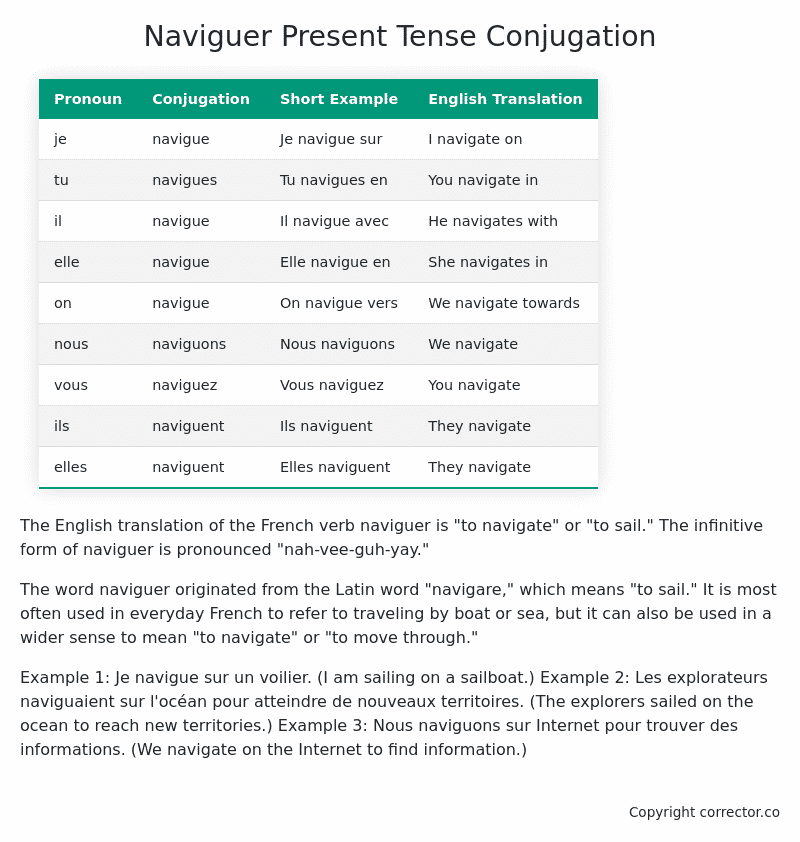Le Present (Present Tense) Conjugation of the French Verb naviguer
Introduction to the verb naviguer
The English translation of the French verb naviguer is “to navigate” or “to sail.” The infinitive form of naviguer is pronounced “nah-vee-guh-yay.”
The word naviguer originated from the Latin word “navigare,” which means “to sail.” It is most often used in everyday French to refer to traveling by boat or sea, but it can also be used in a wider sense to mean “to navigate” or “to move through.”
Example 1: Je navigue sur un voilier. (I am sailing on a sailboat.)
Example 2: Les explorateurs naviguaient sur l’océan pour atteindre de nouveaux territoires. (The explorers sailed on the ocean to reach new territories.)
Example 3: Nous naviguons sur Internet pour trouver des informations. (We navigate on the Internet to find information.)
Naviguer – About the French Present Tense
To take a deep dive into all the French tenses then see our article on Mastering French Tense Conjugation.
Common Everyday Usage Patterns For Le Present
Interactions with Other Tenses
Table of the Present Tense Conjugation of naviguer
| Pronoun | Conjugation | Short Example | English Translation |
|---|---|---|---|
| je | navigue | Je navigue sur | I navigate on |
| tu | navigues | Tu navigues en | You navigate in |
| il | navigue | Il navigue avec | He navigates with |
| elle | navigue | Elle navigue en | She navigates in |
| on | navigue | On navigue vers | We navigate towards |
| nous | naviguons | Nous naviguons | We navigate |
| vous | naviguez | Vous naviguez | You navigate |
| ils | naviguent | Ils naviguent | They navigate |
| elles | naviguent | Elles naviguent | They navigate |
Other Conjugations for Naviguer.
Le Present (Present Tense) Conjugation of the French Verb naviguer (this article)
Imparfait (Imperfect) Tense Conjugation of the French Verb naviguer
Passé Simple (Simple Past) Tense Conjugation of the French Verb naviguer
Passé Composé (Present Perfect) Tense Conjugation of the French Verb naviguer
Futur Simple (Simple Future) Tense Conjugation of the French Verb naviguer
Futur Proche (Near Future) Tense Conjugation of the French Verb naviguer
Plus-que-parfait (Pluperfect) Tense Conjugation of the French Verb naviguer
Passé Antérieur (Past Anterior) Tense Conjugation of the French Verb naviguer
Futur Antérieur (Future Anterior) Tense Conjugation of the French Verb naviguer
Subjonctif Présent (Subjunctive Present) Tense Conjugation of the French Verb naviguer
Subjonctif Passé (Subjunctive Past) Tense Conjugation of the French Verb naviguer
Subjonctif Imparfait (Subjunctive Imperfect) Tense Conjugation of the French Verb naviguer
Subjonctif Plus-que-parfait (Subjunctive Pluperfect) Tense Conjugation of the French Verb naviguer
Conditionnel Présent (Conditional Present) Tense Conjugation of the French Verb naviguer
Conditionnel Passé (Conditional Past) Tense Conjugation of the French Verb naviguer
L’impératif Présent (Imperative Present) Tense Conjugation of the French Verb naviguer
L’infinitif Présent (Infinitive Present) Tense Conjugation of the French Verb naviguer
Struggling with French verbs or the language in general? Why not use our free French Grammar Checker – no registration required!
Get a FREE Download Study Sheet of this Conjugation 🔥
Simply right click the image below, click “save image” and get your free reference for the naviguer Present Tense tense conjugation!

I hope you enjoyed this article on the verb naviguer. Still in a learning mood? Check out another TOTALLY random French verb present conjugation!


